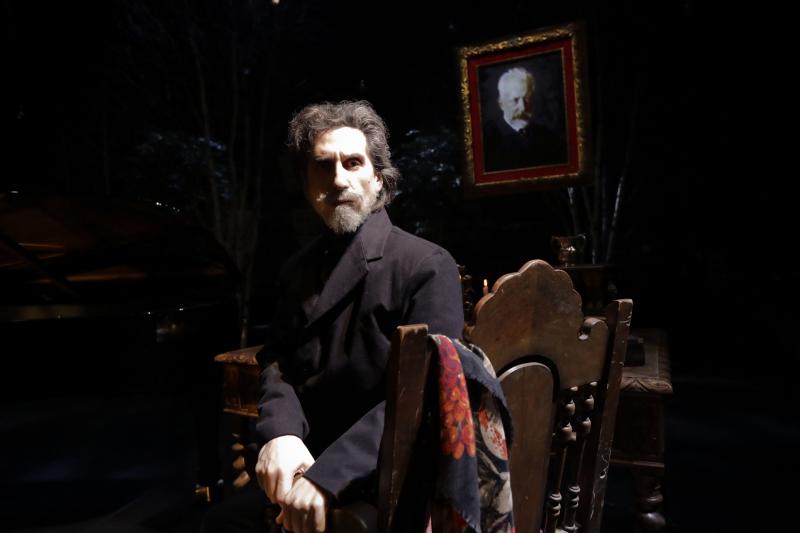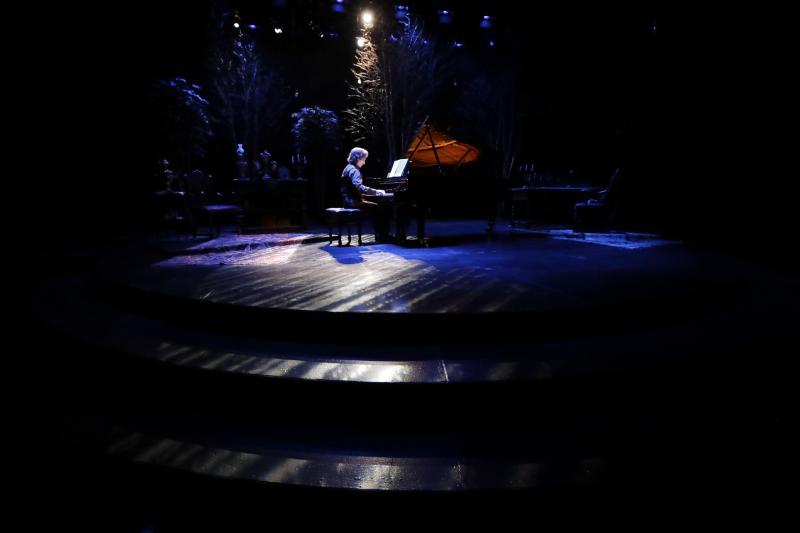Interview: Hershey Felder of HERSHEY FELDER TCHAIKOVSKY at TheatreWorks Silicon Valley Embodies the Iconic Composer of 'The Nutcracker'
Felder performs his hit show live from Florence, Italy on December 20th

Virtuoso actor/pianist/playwright Hershey Felder is bringing us a holiday treat with a livestreamed performance of his hit show Hershey Felder TCHAIKOVSKY presented live from Florence, Italy where Tchaikovsky lived and worked. It is also not so incidentally where Felder himself lives and has been hunkered down ever since his normally hectic life of constant touring was brought to a halt by the Covid epidemic. Hershey Felder TCHAIKOVSKY features an extended focus on the composer's iconic The Nutcracker ballet, and also delves into his life in Italy, and his array of works from the ballets Swan Lake and Sleeping Beauty to the 1812 Overture, and brilliant symphonic works. Presented by TheatreWorks Silicon Valley in partnership with Hershey Felder Presents Live from Florence, the richly cinematic show is directed by Florentine film artist Stefano Decarli and based on the original stage play directed by Trevor Hay. Hershey Felder TCHAIKOVSKY will be presented live on Sunday, December 20, 2020 (5pm PST/8pm EST) with streaming on-demand access available December 21 - 27, 2020. Tickets and more information are available at TheatreWorks.org.
I spoke with Felder just a couple of days ago while he was in the thick of final preparations for the livestream. We talked about who the real Tchaikovsky was and his difficulties as a gay man in tsarist Russia, the enduring popularity of his music, and how Felder is spending the holidays in Florence. He is always a fun and fascinating person to talk to, with his encyclopedic knowledge of the arts and his idiosyncratically musical syntax. His response to even a simple question can be at once funny, nerdy and heartfelt. The following conversation has been condensed and edited for clarity.
One of the things I really enjoy about your works is how you make each one a distinct theatrical experience. You ground each show in a specific point of departure that gives us something to feel, something to connect with. In your Debussy show, A Paris Love Story, for instance, it was your own mother's yearning to visit Paris. What was your "way in" for the Tchaikovsky show?
This was really just being honest about who he was, and also the fact he lived in Florence over the years quite a few times. In the [original version] I did theatrically, it was about receiving a letter from Russia to create the role in Russia [at the same time the Russian government was passing anti-gay legislation]. But what we've learned in the past three or four years since I premiered this show was that Russia is not the only place where there are very severe anti-LGBTQ feelings. We've seen it at home as well, and so I don't think that pointing a finger anywhere is okay nowadays. I think we have to look to our own backyards. But the takeoff place from this really was about understanding a character and what happened to him.
So who was Tchaikovsky really?
Who was he? Complicated, if anything. Perhaps the greatest melodic composer of all time. The most performed composer of all time, that we do know. His works are the single most popular works. Period. Somebody who in his day was very much at first not a star. He wasn't accepted by Russia and he wasn't accepted in the West because he was Russian, and then he became a superstar and everybody thought he was great.
And of course, he was hiding this terrible secret, which was being found out that he lived a homosexual life and what that would mean in Tsarist Russia, the complications that that came with. And also being a very private person, and not wanting the whole world to know. He suffered a great deal because of this, and put a lot of it into his music. But remember, tsarist Russia is you know, not even Donald Trump's America; it's a whole different thing. There's no freedom of expression. The only freedom of expression he really has is in his music.
And in the end there's a huge mystery surrounding the way he died. He died so quickly from cholera, and people it seemed to me over the years have been asking the wrong question [about that]. It was only, "Oh, he could never have committed suicide. That's all just a ruse from the gossip mongers." and so on. His brother and family promoted that he died from cholera, drinking water and sort of not caring about it.
The thing is, I lost my own mother when I was the very same age he lost his mother; mine was of cancer, his was of cholera. This is an imprint that never leaves you. Never. There is no way 40 years later he decided that it didn't really matter what he drank, whether he got sick or not. When he'd sat over his mother's bed as she died from cholera? It's not possible. I mean, it's one thing if he was told it [the water] was pure and he got sick, but that's not the story. The story was that he knew and wasn't being careful. It's just not something that jibes in any way.So what was that about?
This poses a lot of questions and the theatricality of that was interesting, but also just trying to understand the story. The Russians have talked about various things that happened over the years and others jump down their throat trying to say that it's, how do you call it?, conspiracy theories and this, that, and the other thing. I don't give any one theory, but I do pose the questions. And I use the reportage of a case that actually we suspect happened, which was an inquisition into all of this.
Another remarkable aspect of your livestreams are the evocative, visual landscapes they exist in. Given that you serve as your own art director, how did you go about imagining a visual world for Tchaikovsky?
Well, designing a show around the place where he actually lived, which is where we actually filmed - you know, it kind of lays it out for you itself. Walking into his apartment and looking out the window and knowing that this is exactly what he saw 142 years ago. On the days we filmed the imagery that takes place alongside the live playing, it was exactly when he wrote the letter from there, in December. So it's even what it looked like at the time of year. It was kind of fun!

The Nutcracker is so deeply ingrained in our collective consciousness by this point that it's hard to imagine what it would have been like to experience it as a new piece of music. Was it well-received at its premiere?
Not well at all. The Tsar liked it, but the public and the press said it had no inspiration. They liked the music, kinda, but the ballet didn't fare well at all. Of course, it's classic now, but it's only classic because the Americans made it classic. That's way later, when it actually became a Christmas thing.
The first full-length Nutcracker in the U.S. didn't even occur until 1944 when it was performed by San Francisco Ballet on Christmas Eve.
Yeah, it's around that period, the 40's and 50's, after the war, when it started to become something. It was not that before. I suppose some of the tunes were [well known], but would I understand it to be a famous piece? No!
Tchaikovsky wrote my three favorite ballet scores - Nutcracker, Sleeping Beauty and Swan Lake. How is it that he came to write that many ballets? Did he have a particular love for it?
Well, you know it was a job. But also it all started out as pieces that he entertained his nieces and nephews with. He would be at the piano and he would tell them little magical stories and improvise at the piano melodies and themes - and this is what happened when the Ugly Duckling comes, and this is what happened when the Prince comes, and this is what happened when the Swan comes. And they eventually turned into [full compositions], the way you know art grows, organically.
Interesting! And that explains why his ballet music is always so evocative of the story happening onstage.
Oh, he was brilliant at that! First of all, he's such a great composer. Everything he comes out with is just so well-crafted. He's the real thing, not somebody who had a few good melodies and kind of plucked out a few tunes. This is somebody who really, really knows what he's doing.
You'll be spending the holidays in Florence, and I've often wondered what it would be like to do that. This is obviously anything but a normal year, but in a normal year, are there any Italian holiday traditions that you particularly enjoy?
Well, it's my first time at home ever in a holiday. I'm usually onstage in some city doing things for other people who need to raise funds. I don't get to celebrate. I get to be the paid monkey, you know? [laughs] This is the first time I actually can sit down and have a proper holiday meal with family and friends - I mean in our pod or whatever it is. There's only the four of us. Here we're still kind of locked down so you can't really go places or go to friends or go for dinner. So - I think it's a lot about cooking and not eating too much. [laughs] That's what the holidays is about.
And I'm working because I'm doing a new show, a world premiere, in February about Sholem Aleichem, called Before Fiddler. That starts filming the 14th of January.
And just a quick final question. In the end credits of A Paris Love Story, you thanked Kim and "Leo." I know Kim is your wife, but who is Leo?
Leo, my dog! Our standard poodle. Yeah, I love Leo.
And since you're home for once, you can actually spend time with Leo over the holidays.
You know, it's the first time I get to spend time with both of them. I mean, Kim's always schlepping to see me, but this is the first time we're home with our pet and sort of living life like normal people. I mean... as normal as this time is.
(Photos courtesy of Hershey Felder Presents)
Comments
Videos

